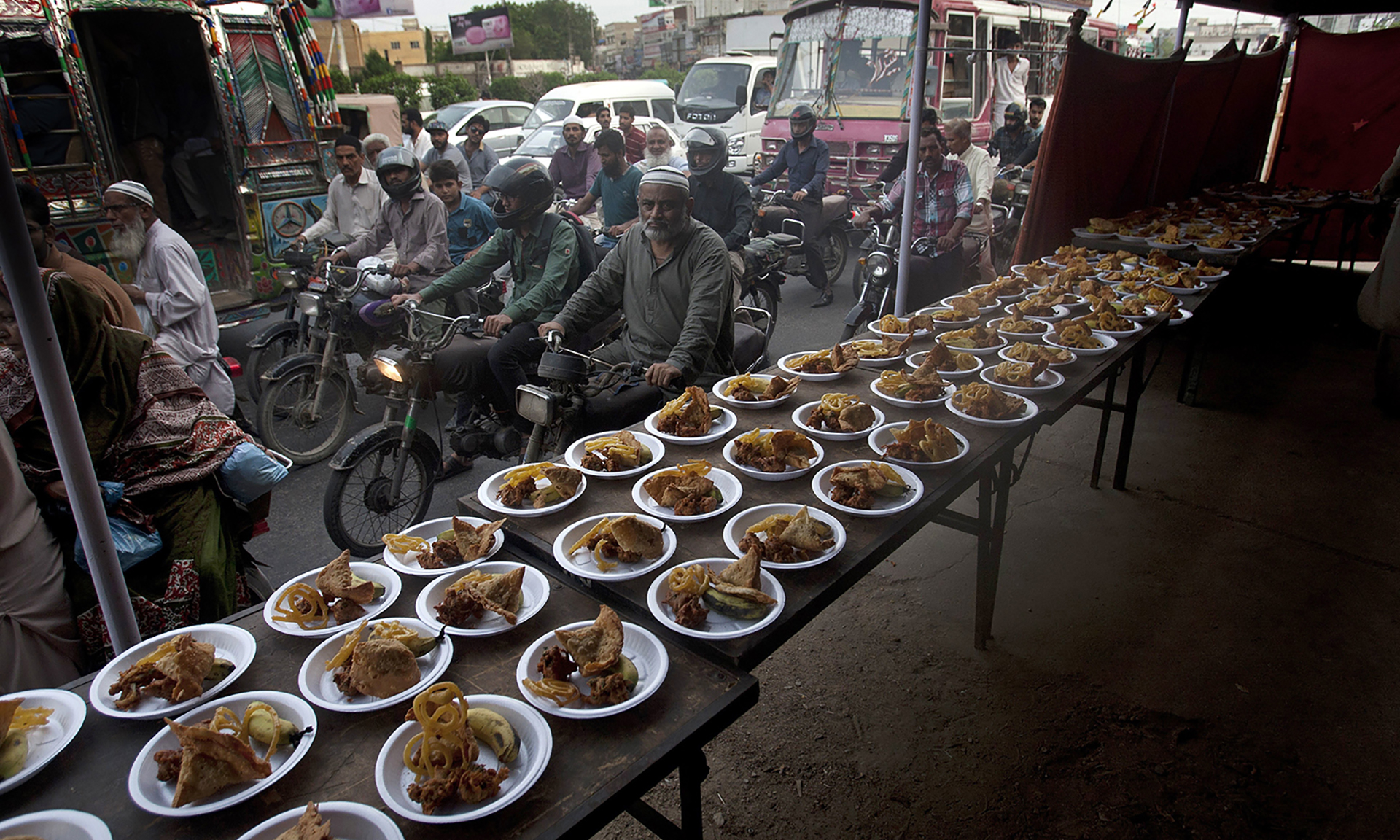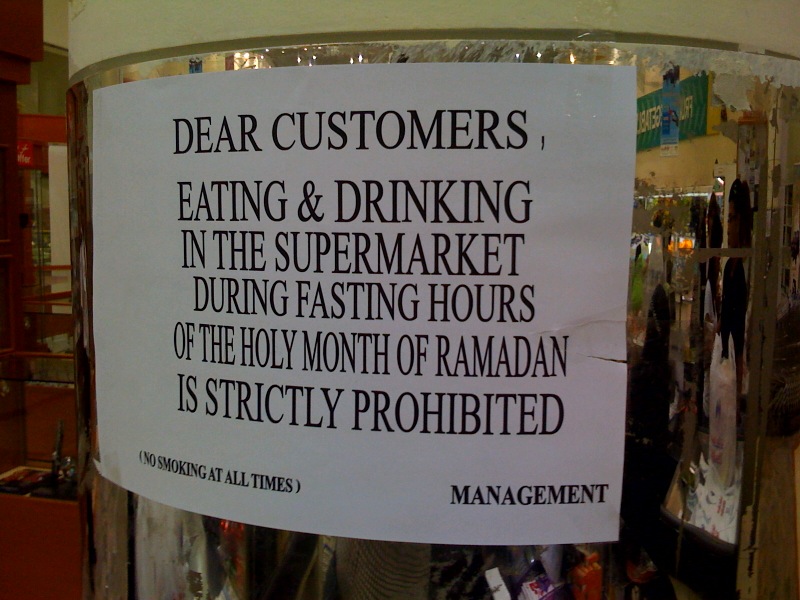By Shamila Ghyas
It’s that time of the year again when everyone starts fighting whether it is Ramzan Mubarak, Ramadan Kareem or a chutney of the two – Ramzan Kareem.
Call it whatever you like, but one thing is certain: we will once again spend this year not bathing in the spirituality of fasting, but rather worrying if the neighbor’s aunt’s daughter’s husband is fasting or not.
Whether cousin Shabana really can’t fast or is she just lying about it. Why that guard outside my favorite shoe store took a sip of water at midday when I literally have to fan myself with my oh-so-weak hands to quench my thirst in my air-conditioned car.
Be honest. In the non-Ramzan months, how many times have you gone for dinner at a casual restaurant and then told the management to get rid of the beggars outside peeking through the window? How many times have you gone to buy a kebab roll with a hungry child staring at you through your car window, maybe trying to sell a small comb?
How many times did you react irritably even if just in thought. ‘It’s hard to even eat a roll without them bothering me,’ you may have said to yourself.
In fact, how many times have you eaten something knowing very well that there are people outside the restaurant who can’t afford a proper meal?
The point is, realize it or not, we have meals all the time while many go hungry. We eat food day in and day out while others starve right outside our doors.
Then comes the month of Ramzan where one of the many things we are supposed to learn and experience is how the poor feel. To learn about their hunger so we can do more for them. To learn to empathize.
Stating the obvious here, but to truly understand, we have to lead our normal lives doing everything: work, chores, errands, and so on, all while fasting.
Why is it, then, when it is our turn to not eat, we force others not to do so either? Does this not defeat the purpose entirely? (Sleeping through the fasting hours does as well, but that’s another conversation entirely.)
So, why should the poor laborer grueling under the sun not be allowed to eat? Why should the cleaning lady who scrubs three houses in one day not be allowed to eat? Why should the guard who is outdoors under the scorching sun not be allowed to drink water?

In 1981, Pakistani President Zia ul Haq passed the Ehtram-e-Ramzan Ordinance, which stated that anyone eating in most public places during the holy month will be fined and/or jailed for three months. Any hotel, restaurant, canteen or person in charge that willingly offers or serves food during fasting hours might be jailed for 3 months and/or given a fine of Rs. 50,000 – equivalent to about $177.
Only hospitals, railway stations, trains, airports, or school canteens for children would be exempt.
Where was this ehtaram (respect) when we were eating in front of the hungry? Where is this ehtaram when we go out to eat and make our helpers sit in the corner without food, while we finish ours?
There are so many reasons why someone might not be fasting: old age; illness; medication; pregnancy; upcoming travel; being a non-Muslim; or maybe he or she just did not feel like fasting. If so, then that matter is entirely between the individual and God. It has nothing to do with us.
We are not a connecting zoom call between them and God! So why do we impose what we are doing on others?
Is our faith really so weak that the sight of another person eating shakes our inner imaan (faith)? Do we have no self-control whatsoever? Would our stomachs would growl so loudly that it would break everyone’s fast, including ours?
What is the point of fasting when we have to force others to make our fast easier?
Apparently, another person eating does shake one’s faith because every year, stories go viral about how someone was beaten because they were “caught” eating.
In Ghotki, in Sindh province, 80-year-old Gokal Das was once beaten up severely for eating rice 40 minutes before Iftar time – when Muslims traditionally break their fast.
He was 80 and not even a Muslim. Let that sink in!
Even our own grandparents at home don’t fast at this age. Do we go around beating them up too?
And to make matters worse, he was assaulted by a policeman, a person whose job is to literally protect citizens. However, I think if goons from the Islamist Tehreek-e-Labbaik party found someone eating in public, they’d probably go straight over and lynch him.
Pakistan is not the only country where such aggressions happen. In Iran, a judge once sentenced a Christian man to have his lips burnt with a cigarette because he ate in Ramzan. This punishment was carried out in the open in Kermanshah. Five other men, this time Muslim, were also flogged with 70 lashes for not fasting.

Just a few years ago, 147 shops were also shut down for serving food, and three people were arrested for eating in public. Iran’s Penal Code does not specifically ban the consumption of food or water during Ramzan, so through a loophole, they are instead punished under Article 638 – a ban on committing ‘sinful’ acts in public.
I suppose in Pakistan, it’s small consolation that it’s not the government that carries out such punishments, but instead over-zealous nutters – and even then they are sent to jail for their crimes.
Personally, I think the UAE seems to maintain the best balance. In most cities, eating in public is not allowed but most malls and restaurants remain open to serve those not fasting. And guess what – fasters don’t lose their minds and attack those who are eating. If someone does eat in public, all hell does not break loose – pun not intended.
There is another UAE law that would do well were it to be enforced in Pakistan – avoid arguments and aggressive behavior in Ramzan.
It’s the month of peace, of reflection, of charity, of empathy, of kindness. Where are all these things? Why do we have in place this notion of rigid behavior and superiority, where we impose what we are believe is right on others?
Whatever happened to the Quranic verse which states that there should be no compulsion in religion?
Perhaps this line should be plastered on billboards and posters all over Pakistan, lest we forget this vital lesson that serves as a reminder for us all.
This piece originally appeared in The Pakistan Daily.
 Shamila Ghyas is a firm believer in tolerance and equal rights for all. Having penned two fantasy fiction novels, she also writes for various publications highlighting issues generally ignored by the masses. Her main focus is on the rights of women, children, and minorities. She loves reading, music, and Nutella.
Shamila Ghyas is a firm believer in tolerance and equal rights for all. Having penned two fantasy fiction novels, she also writes for various publications highlighting issues generally ignored by the masses. Her main focus is on the rights of women, children, and minorities. She loves reading, music, and Nutella.
Find her on Facebook and Twitter.

